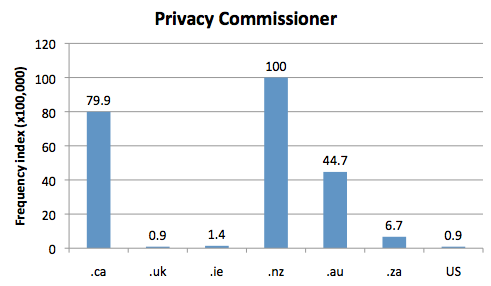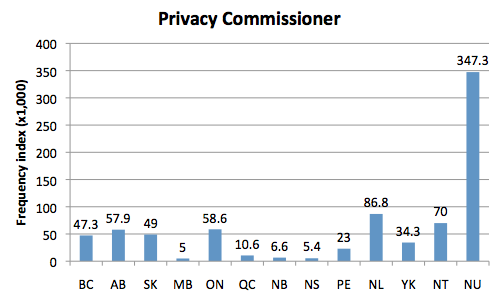Quick links
Privacy Commissioner
DCHP-2 (Jun 2013)
Spelling variants:privacy commissioner
n. — Administration, Politics, Law
an official reporting to the House of Commons who is responsible for overseeing and if need be investigating, the proper handling of personal information by all corporations and groups, governmental and private alike.
Type: 1. Origin — The position of Privacy Commissioner was created in 1977 by the Canadian Human Rights Act, which was passed into law that year in response to concerns about the handling of personal information in government databanks (see Parliament of Canada reference). Privacy Commissioners exist on the federal level (one position) as well as in each province and territory (a total of 13). The position also exists in New Zealand, where it was created in 1993 (see NZ Privacy Commissioner reference). As Chart 1 shows, the term is very frequent in Canada. Chart 2 attests to its use in all provinces and territories (the prevalence in Nunavut is a result of the nature of the .nu domain, which is largely comprised of governmental sites. This imbalance casts doubt on the very high frequency in relation other Canadian locations).
See: privacy czar
Quotations
1977
But it leans slightly toward the Swedish model, too, in that it recommends one chief ombudsman with several assistant ombudsmen. The assistants would probably include the Government's correctional investigator (who now reports to the Solicitor-General) and a federal police ombudsman, an office the Government has said it plans to create.
The report also recommends that the ombudsman's office take under its wing the federal privacy commissioner, who is an officer of the Human Rights Commission responsible for examining complaints about refusals by the Government to allow individuals access to files on themselves.
It also urges that the ombudsman's office encompass the information commissioner, who would have the advisory powers suggested by the federal Green Paper on public access to Government documents.
1982
Mr. Cole, a former articling student with Mr. Copeland who subsequently shared office space with him, also filed a request for information with the Solicitor-General's department.
When Mr. Blais turned down the requests, the lawyers launched an appeal to the privacy commissioner appointed under the Human Rights Act.
Ottawa law professor Walter Tarnopolsky, acting as privacy commissioner for the case, conducted a hearing on whether the refusal by the Solicitor-General was proper.
1987
Grace never went to court to press the complaint but when Ternette took legal action at his own expense, Ottawa was forced to admit it had improperly classified the files as exempt from release under the Privacy Act.
The privacy commissioner said he simply assumed the data bank in question had been properly classified as exempt, so he never bothered to ask the Mounties or other officials if it conformed to the law.
"We had no time, it's a vast job to audit an entire bank," Grace told the committee.
1992
It's a Catch-22 situation.
Sally Jackson, public-affairs spokesman for the Privacy Commissioner's Office, was unequivocal: "We encourage consumers to ask why the SIN is needed and how it will be used, and to refuse if they are unsatisfied with the answers," she said.
"Unfortunately, as Mrs. Malcolm found out, they can then be denied the product or service," Jackson acknowledged.
2002
Initially, the Yukon Medical Council found the long-time Yukon doctor guilty of unprofessional conduct and the Grennan family had successfully sued Reddoch and the Whitehorse General Hospital for about $140,000 in damages in a separate civil case. As well, Reddoch and the Privacy Commissioner took a side matter to court after Reddoch wasn't given all the documentation the council used against him after he made an access to information request.
2009
Phil Sorgen, president of Microsoft Canada, assured that all data will be stored in Canadian computers that meet privacy regulations.
In a statement, Microsoft also quoted Ann Cavoukian, the privacy commissioner of Ontario, to stress the security of the system.
"I urge (health care) providers to actively pass on the benefits of these services to individual patients," Cavoukian is quoted as saying.
2016
Given the increasing use of video cameras in public spaces, and its potential effect on privacy, Canada's and Alberta's privacy commissioners have developed guidelines to help municipalities decide whether collection of personal information by means of camera systems is both lawful and justifiable and, if so, to understand how privacy protection measures can be built into the use of a camera system.
References
- Parliament of Canada • "Officers of Parliament - Privacy Commissioners 1977 to Date"
- NZ Privacy Commissioner • "Introduction"
Images

Chart 1: Internet Domain Search, 19 Apr. 2016
